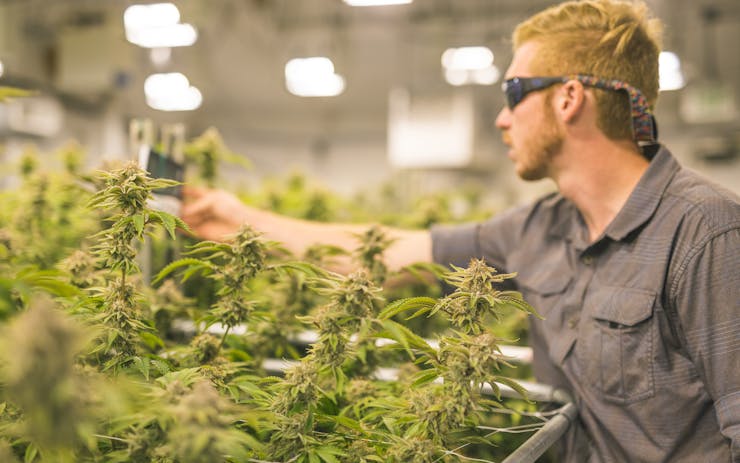Liberal MPP for Hamilton Ted McMeekin is looking into restricting where medicinal cannabis growers will be able to set up greenhouses when the product is grown in mass quantities.
McMeekin, who is the former provincial agricultural minister of Ontario, told the Hamilton Spectator that industrial-sized greenhouses should stay away from land that’s fit for cultivation. “You shouldn’t be building greenhouses on class 1 agriculture land,” McMeekin told the paper. “You should do it on class 3 or 4 land where you can’t grow anything.”
'To treat (cannabis) as something separate from agriculture is extremely problematic. You can’t allow some greenhouses to be built and others not simply because of the product that’s grown inside.’
Only one per cent of Canadian farmland is rated class 1, which is defined as the most fertile agricultural land available. McMeekin suggests licensed growers look to northern Ontario to set up production, since the region could benefit from jobs and economic growth the new developments would inevitably create.
Hamilton City Councillor Lloyd Ferguson also wants city planning staff to consider a limit on grow-ops in rural areas, and create stricter regulations. “[Cannabis companies] are not respecting [the planning guidelines],” Ferguson told the Spectator. “They are coming in with applications up to 75 acres, 200 acres. This is a ballooning issue.”
Hamilton’s plan is to limit cannabis grow-ops to 2000 square metres. McMeekin says the city’s planning department has collected proposals for “concrete bunkers” to house the grow-ops. “I can’t see the province supporting carving up the Greenbelt with bunker buildings,” he told the paper, referring to the region of agricultural land in Southern Ontario that is protected by the provincial government.
Lesley Campbell is an associate professor at Ryerson who studies the evolutionary biology of cannabis. She calls McMeekin’s proposal “problematic” and believes Ontario’s landscape won’t drastically change if industrial medicinal cannabis facilities are granted permission to develop on farmland.
Hamilton is already home to industrial-sized greenhouses that occupy prime farmland and grows everything from cucumbers to chrysanthemum.
“Regardless of which plant we’re using, this is farming, after all,” she says, noting that the Hamilton area is well known for its horticulture—the region is already home to industrial-sized greenhouses that occupy prime farmland and grows everything from cucumbers to chrysanthemum.
“The idea that we should be limiting what a farmer can do with his space is very problematic, in the sense that it’s limiting what his potential income can be,” Campbell says.
She also takes issue with the suggestion that greenhouses can reduce the productivity of land, noting that an agricultural greenhouse can be converted into facilities for different crops, since they provide the ability to produce year-round.
“It’s not as if the medical marijuana greenhouse is limited to producing cannabis,” she says. “It can be used for tomatoes or cucumbers. So if there’s ever a time when we lose the need to produce cannabis at this scale, this can easily be converted for another purpose.”
Tweed Farms’s facilities in Niagara-on-the-Lake are one example of that. The company converted a former pepper and eggplant greenhouse into a commercial medical cannabis operation.
Suggesting producers move north to set up their facilities on class-3 land is an expensive option, Campbell says, “essentially making it financially impossible to grow marijuana.” Housing the facilities in urban areas isn’t a viable option either, since Canadian cities aren’t allowed to have a physical structure containing cannabis within 150 metres or residential and institutional zones.
Suggesting producers move north to set up facilities on class-3 land 'essentially (makes) it financially impossible to grow marijuana,' says Campbell.
Campbell, who’s a Hamilton resident, believes McMeekin’s proposal would ignore cannabis as an agricultural product.
“Yes, it is a health product and something that needs to be regulated,” she says. “[But] to treat it as something that is separate from agriculture is extremely problematic. You can’t allow some greenhouses to be built and others not simply because of the product that’s grown inside.”
Bill Panagiotakopoulos is the Chief Operational Officer with Beleave.com, a licensed producer based in Hamilton. He’s currently in the process of applying for an 80,000 square foot expansion. He says if McMeekin’s proposal passes, it will cost the city about $12 million worth of investment from his Beleave alone, along with more than 80 jobs. He likens the MPP’s quotes in the Hamilton Spectator article to “reefer madness” that “isolates marijuana like it’s this big bad thing.”
“For about five years we’ve been working on this plan (with city officials) and no one had ever suggested that it was going to be an issue, certainly nothing like this,” he says. Both Campbell and Panagiotakopoulos are baffled that McMeekin was quoted as saying “sometimes I wish we had left it alone” when talking about the lead up to legalization in the country.
“He’s suggesting that the government do nothing with a $10 billion illegal trade, as it stands right now,” he says. “I think that’s ludicrous. I don’t think elected officials should be making those comments.”
Campbell would like to see a spike in dialogue between politicians and scientists, so there’s more fact-finding in the making of policy. “The more fact-based work, the better, because ultimately that’s what’s going to help us make rational decisions,” she says.
McMeekin could not be reached for comment.





